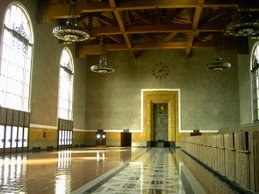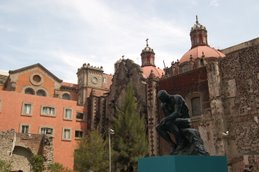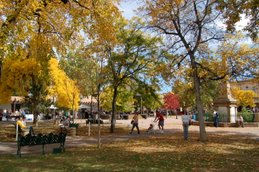Real Estate in 2009 is the Worst Since the Great Depression
Existing home sales for 2009 are out and the national numbers are terrible. Median prices sank 12% Year over Year, marking the worst on record since the Great Depression. Month to Month sales figures also dropped almost 17% from November to December, marking the worst decline ever. Not a great way to kick off 2010. All of this is with life support from the Federal Government through tax credits, purchases of Mortgage Backed Securities, and FHA being the lender of last resort. The question is, what happens when the Government stops buying MBS in March, ends the tax credit and FHA becomes insolvent? I'm afraid we got a taste of the numbers when the rush to buy was over at the end of November, when the tax credit was due to end. I don't put a lot of weight on Month to Month numbers, but this was hard to ignore.
Sure, you may argue the Westside is different compared to the National Market. True. But the Westside hasn't corrected as much as other areas, so the downside risk is even greater.. Of course homeowners, investors and the real estate industry will tell you the Westside won't correct any more because they have vested interests. Look at history and you will see that affluent areas take longer, but they usually drop the hardest.
With only 2 years into the downturn, throw in unemployment, loan recasts, bank failures, tight credit, rising mortgage rates, shadow inventory and record foreclosures, the next 5 years will take it's toll on everyone.




























49 comments:
Month to month numbers mean nothing. Especially after a month where incentives were set to expire. Of course numbers would be down. I expect month to month numbers will rise sometime before April then drop off considerably in May and June. That doesn't mean we are crashing again. Year over year numbers are always best for more reasons than I wish to elaborate on in a blog comment.
All of the Westside isn't doing well (Manhattan Beach down 13.5% y-o-y) but there are pockets that continue to hold up after 2.5 years of recession. 90403 year-over-year is down less than 2%. 90404 was up 1.5% and 90401 was up more than 2% year-over-year. The famous 90210 was down 2% y-o-y.
Whether you are a bull or a bear you can't change the fact that in every recession there have been pockets where people were not affected as much as others. Its not to say they don't go down. It's just the drop is more modest. Not every area is going to see drops of 50% off their peak numbers. These pockets can be as large as an entire zip code or as small as a neighborhood within a zip code. For example the Franklin neighborhood in 90403 or the entire 90401.
Also throw in high gasoline prices. $3.00+ a gallon for gas in an economy that is on life support is not good at all.
"Look at history and you will see that affluent areas take longer, but they usually drop the hardest."
Affluent areas drop the hardest dollar-wise but not percentage-wise. Historically affluent areas weather recessions better with a smaller percentage drop in price. Of course the affluent house values are many times that of homes in less affluent areas.
A $3M house in an affluent area that sees a 20% decrease has the owner losing $600k. A $500k house in a normal neighborhood seeing a 40% decrease has lost $200k of its value.
The flip side to this is desirable affluent areas are the first to recover and recover more than other areas. It's a lot easier for the $3M house to gain back its 20% drop than the $500k house to gain back its 40% price drop.
The first areas to recover, at least during this housing correction, are the lower tiers. The upper tiers are only beginning to correct now, and that is largely due to the fact that these areas had a lot of 5 year option arms. There is a chart, which I'm sure many have seen, that shows we are just at the beginning of that recast storm. These "pockets" are not immune, and will correct in a big way. Add on to that the higher intterest rates coming....
Also, I don't think many are accounting for the fact that as the baby boomers retire and pass-on, and the upper end is held largely by boomers, that the upper end will take another hit. The next generation just doesn't have the wealth to support the prices. Based on these facts, it is likely the upper end won't see "real" price appreciation for decades.
Like it or not the first areas to recover are always the upper end or upper middle end. Maybe you can find a zip code that's the exception to the rule but that doesn't change the rule for the last 3 recessions.
I don't think you are accounting for the fact that as the baby boomers pass-on their wealth and properties are passed on to the next generation, which is a smaller group than the baby boomer generation. Their wealth & paid off houses, as most wealthy retirees own their homes outright, don't just evaporate when they die.
So the next generation is due for the largest exchange of wealth in history making them the richest generation.
Since the next generation is a smaller group than baby boomers wealth will consolidate more. It makes sense to think these newly inherited rich will be buying in the upper end.
Based on these facts, it is likely the upper end will see "real" and considerable price appreciation for decades starting when baby boomers pass-on.
"Based on these facts, it is likely the upper end will see "real" and considerable price appreciation for decades starting when baby boomers pass-on."
Hello? Who are they going to sell their houses to when everyone else already have a house or two?
Well Hello back! Keep in mind there are people that own and people that rent. Not all people will leave homes to their heirs.
It may be easier to explain this another way. Your parents are baby boomer generation from a large middle class family. Assume you are a slacker living in a lower middle class neighborhood. You are the heir to the wealth created by your parents. Being the only nephew of an aunt and uncle you are their heir. When all pass on you will have the wealth of your parents, uncle and aunt. It doesn't matter if any of them owned or rented. Will you choose to live where they lived, keeping in mind each of them only had a fraction of your new combined wealth? Or will you move to a place where the combination of all their wealth can buy you a nicer place? This is how many middle class baby boomers make a single upper class individual with the consolidation of wealth under the largest transfer of money in US history. No upper class baby boomers had to die leaving home vacancies to create this new upper class individual.
This wealth transfer will create a larger discrepancy between the haves and the have nots. Those that receive the transfer of wealth and those that do not. This will drive up the upper middle class and upper class home prices (historically the class of people that save and amass wealth to pass on) while leaving the lower middle class and below behind. This may create vacancies in the lower middle class homes - this is not necessarily the case because of migration and the multigenerational factor. But that doesn't matter here.
Remember, you're living in a lower middle class home and now have the wealth of 4 people to buy in the upper middle class neighborhoods. When you and many other similar heirs decide to move up into these neighborhoods, what do you think that will do to demand in those better neighborhoods?
Demand in the upper class neighborhood will go up more with the combination of middle class wealth than supply will decrease with the death of upper class wealth. The discrepancy between upper and lower class will grow larger. Demand in nicer neighborhoods will drive up values while lower neighborhoods could be left will stagnant values. Wouldn't you know it, the rich get richer. Amazing how all that works.
This is a slow transfer of wealth so it will take decades. People will move up in stages, not in one leap as per my example. But the end result is the same.
You're idea that the upper end will take a hit when baby boomers die doesn't hold up due to the consolidation of wealth as described above. Neither does your idea that the next generation doesn't have the wealth to support the prices. The baby boomers wealth is passed on, it doesn't disappear into thin air. It consolidates creating more people with upper class wealth leaving behind less middle class wealth. 4 middle class estates consolidating into 1 upper class wealthy person.
Oops, I meant demand in the upper class neighborhood will go up more with the combination of middle class wealth than supply will increase with the death of upper class wealth. This is due to the disproportionately large middle class compared to upper class population.
What's going to happen when the baby boomers pass on is that the children and/or relatives are going to sell the place for whatever they can get and pocket the cash. That is reality.
Also, like it or not, the lower end has pretty much corrected and is recovering first. The upper end is on its way down and will continue to fall for many years.
12:30 Anon, there are just some people who don't get it. Don't bother trying to give a real economic scenerio. Some people only believe the economic advice they get from their mechanic.
Jorey, Boston College recently did a study that explains why the $41 trillion wealth transfer estimate is still valid even through this current recession. I won't go into details since some people on this board just want to believe the US & real estate will crash when baby boomers pass on. Its an interesting read for someone who understands.
12:49 Anonymous, did you read any of the above posts? It's not just about the baby boomers houses, it about wealth transfer and how that will affect future RE values. If your inheritance is a $200k tract home and some buttons then I guess you'd just pocket the cash & you might not see the economic shift I was trying to explain. We'll agree to disagree. But I suggest you look up some of the Harvard Univ, Boston College and Northwestern Univ studies into this forthcoming wealth transfer. You're perceptions may be changed by this research.
It's hard to deny which tiers of the market are rebounding first. The lower end has cleared most of the listed and shadow inventory. This is evident by the high number of sales. The mid tier has begun to clear, yet the higher end is still clogged with inventory and very few sales. As the higher end can hold out longer, it will be the last to correct. In addition, the lower end inventory cleared due to the subprime implosion. The mid to higher end was fueled more by Alt-A and Prime toxic products. Looking at the schedule of recasts hitting now through 2012, we will see a slow, but sure clearing of high end inventory, via short sales and foreclosures.
As an attorney I can tell you what happens when the parents pass on. The house is sold, the proceeds divided up among the survivors, and for the most part the cash is not used to buy homes. The transfer of wealth is dispersed among many, and none of those many will have the wealth of their parents. The next generation of buyers simply won't have the financial resources of their parents, and thus the prices in the upper end have no where to go but down.
It's interesting looking at all the resistence to reality, including telling those who see things the way they really are to look at some college journal. Based on objective criteria, the blog writer sees the truth -- the upper end has nowhere to go but down, and it will be going down for years. One would be well advised accept reality and not deny it.
It would be really interesting to see the historic ratio of prices for neighborhoods that have pretty much corrected (e.g., Inland Empire) to the upper end. For example, if the average house price in Riverside in 1999 was X, what was the multiple of X that would result in the average price in some of the upper end zip codes for 1999? Then one could take that ratio to predict the price to which the upper end zip codes will eventually decline to. Of course I don't think the correlation would be perfect but it would be an indicator.
Attorney, these weren't college journals. They are studies done by economists and finance PhDs. The baby boomer generation is larger than the next generation. Consolidation of wealth is likely to start occurring.
Disbursements across multiple people have been common as the greatest generation wills you are executing are going to the disproportionally larger baby boomer generation. This is not the case for the baby boomers passing on to their hiers.
Hello some more to "Hello back" :)
I do see the logic in your argument and would like to argue that it rests on a key assumption and that is the baby boomer generation e.g. people's parents will have money to pass on. The wealth destruction so far has been great. I am sure we have all read about how much paper money has evaporated. With all the different types of debt people have, they'll be passing on debt and not wealth.
The Boston College Center on Wealth and Philanthropy research on this subject has been revised twice since its first writing in 1999. The latest revision in 2009 holds up that the $41 Trillion wealth transfer is still on track as numbers in the early 2000's exceeded transfer estimates and recent numbers met estimates. This allows for down years ahead or we will exceed the estimates.
As some peoples wealth decreased it still went somewhere. The question is where did the wealth go? If it leaves the baby boomers hands and arrives back in a baby boomers hands it doesn't effect the numbers. It's only when the money ends up overseas, in charity or government that the money ceases to be passed on to US residents.
When you loose money it doesn't evaporate. Someone else eventually gets it. Even if its a company that gets the money it eventually finds its way into the owners pockets, stockholders pockets or the employees pockets.
Yes, lots of peoples wealth has been wiped out recently. And yet a lot of money has just shifted from one group of pockets to another group. The money didn't disappear and cease to exist. It's just not being put back out there by the people holding on to it.
We could go further with this and discuss how working baby boomers are likely to be receiving the most benefit from a company as the senior wage earners and executives, thus receiving a lot this shifting money. Retired baby boomers have moved wealth into safer investments leading up to retirement such as cash, bonds and so on. They are not wiped out, just being cautious with their spending. Its those few people caught in the middle, too close to retirement to earn the money back and not smart enough or they felt not close enough to retirement where their money was still invested in higher risk assets. Those are the baby boomers who are wiped out. That small pocket of overall baby boomers is not going to effect the overall shift of wealth.
I support both sides of this argument
The top end families have built up huge wealth that will go to the next generation. The vast bulk of families haven't built up real wealth.
What you are forgetting is that the wealth that will go to 90402 buyers doesn't just go to people now living in LA. What happens is that all over the USA when people inherit very substantial money they think about a life change. So yes, a kid living in Sunset Park that gets a huge windfall will move to the 90402.
But a kid living in Detroit, Chicago, Cleveland or Pittsburgh who gets a huge windfall may ALSO move to the 90402. The point is, if you can live where ever you want, why stay in a cold boring city in the middle of the US when you can instead move to the 90402.
Of course the 90402 is not the only great place in America to live, but my point is that places like the 90402 draw from a larger area than you might think.
All the people on this blog who argue that 90402 house prices have to some how line up with incomes forget this phenom. There need not be any correlation at all between income and house prices if people with wealth come in.
To point out the obvious, a house in Aspen costs 20x the average Aspen income. But this is sustainable since most people in Aspen make their money in other cities and spend it in Aspen.
It depends if single or married. Married people who inherit money may indeed move North of Montana. Single people who inherit money tend to move to neighborhoods other than N of Montana
I've given up on WESTSIDE properties decreasing in value... I'm waiting for the smoggy Valley to decrease to proper price to income levels. (The bad parts of the valley in bad school districts are closer to proper price/income rations. But I want a small house with a pool south of Ventura in Woodland Hills school district.
The thing I find odd is no one is factoring in inevitable natural disasters affecting housing prices.
The odds of a HUGE 7.0+ HAITI-style quake in L.A. area is pretty high.. I know it's morbid to think about.. But it'll be alot easier to walk away from your structurally damaged RENTAL property post Earthquake... then try to collect on insurance companies that will try to find anyway to screw you.
You can give up on the westside properties dropping in value, but the key ingredient in being a good investor is patience! Sometimes there are two markets. Take old beatles for example. There are people who think they are the cat's meow. So a split window 64 beatle sells among the beatle crowd for a lot of $, but for the rest of the people it's just transportation. There is a huge differential in price. The westside market is moving from a "beatle market" to a normal "transportion" market. When the market normalizes, which it is doing, prices will normalize. It make take a few years as the alt-A and option arm's move thru the system, bankruptcies are closed, it becomes apparent there are no move up buyers, and interest rates rise, etc. as the blog writer indicates, but your patience will be rewarded! Just be patient. If you are, you'll be able to get a steal. The higher end is always the last to fall, but when it does it falls hard.
One should consider earthquakes when purchasing a home in Southern California. The area is riddled with faults and the type of construction you live in makes a big difference. For example, I would avoid condo buildings with subterranean parking as they can collapse during a strong earthquake. During 1994, Santa Monica was hit pretty hard due to older buildings with subterranean parking. Also, how many people actually have earthquake insurance these days?
'Also, how many people actually have earthquake insurance these days?'
Zero.
That is just it.
Everyone on this blog is saying to buy a 50 year old fixer upper in the 90402. No one is saying that the 3 million dollar new homes are the thing to buy.
Thing is, the codes are stronger now. The 50 year old house will splinter and kill you while the new home will keep you alive.
Bottom line is sometimes you get what you pay for. Part of the high cost today is in the better and more earthquake proof structure.
Let's wait until the next Haiti type earthquake and see who is smarter. Perhaps it will be the people who spent to buy NEW
Neither the new construction nor the 50 year old fixer upper is the thing to buy, unless you don't care about losing your down payment.
Look, we can argue all day about buy vs rent. But who can argue about the fact that when a kid in Cleveland inherits $10 million bucks he just doesn't want to stay in Cleveland. Where are you going to enjoy your $10 million more - North Santa Monica or Cleveland?
Like everyone on this blog I really really want North Santa Monica prices to come down, for obvious reasons. But don't deny the fact that rich people would rather live in Santa Monica vs the cold wet parts of America.
Rich will move in to Santa Monica, non-rich will move out. The same process has taken place in many other places. If you don't like living among rich people, leave North Santa Monica now.
And just cause plenty of rich people move here doesn't mean prices will go up from here. Plenty of rich in the Hamptons but prices are down 40%. Rich does not mean prices go up from here. But it does mean that if you are not rich you don't belong in North Santa Monica.
Not rich? move to South Santa Monica. The rich will stay the heck away due to the trailer park in South Santa Monica and the shootings in Virginia Avenue Park.
'Not rich? move to South Santa Monica.'
Um, last time I checked, you still needed 1.5m to move to Sunset Park for a nice well sized home....
Feb 2, 10:04 Anon:
Your ratio doesn't account for less desirable areas will fall more than more desirable areas. Applying a ratio from 1999 to today's prices leaves out any change in demand or popularity of the comparing cities. Your ratio assumes demand is the same for comparing cities in 1999 as in 2010. Your ratio assumes the upscale city will crash proportionally as hard as Riverside. Your ratio assumes Riverside has reached a bottom.
You would need to factor in historical population growth to determine a sliding scale of demand adjusted prices for each location. Then apply that to get a projected 2010 ratio. A lot changes in 11 years from 1999 to 2010. Riverside didn't increase in popularity or value as much as Brentwood did in the 1990s or 2000s so the ratio between the two cities would be different each year of your dataset. Picking one year will give you misleading numbers as demand could be on an upswing or down swing in Brentwood and Riverside. Your new 2010 numbers using a 1999 ratio will be very far off. Essentially misleading garbage data - which is what I read a lot of on these blogs. If it were only this easy we would all be real estate millionaires by forecasting the bottom.
Now I'm going to tell my parents my economics degree wasn't a complete waste of time.
You've got to be kidding! This is what the people say in Manhattan Beach, Newport Beach, parts of Irvine, Beverly Hills, the Hollywood Hills, Malibu, NYC, etc. etc. etc. Frankly, SM is not that great -- the beaches are clearly sub-par and there are homeless everywhere.
The real issue is not 90402 vs Manhattan beach vs Malibu. All are wonderful places to live and all of them will rise or fall in unison. I never bought the argument that one of them could boom while the other crashes.
The real issue on the table is, all over the USA families have built up enormous fortunes. The younger generation is starting to inherit this money. If fortunes are built up in the midwest, are the kids that inherit this going to stay in the midwest or are they going to move to a sunny place with perfect climate?
At the end of the day, all that I see indicates that kids that inherit lots of money want to live in nice places and not stay in the midwest.
No one is arguing that all the rich people in America want to move to GRS. But I am damn well arguing that they will move to the nicest places in the USA. The nicest places will will rise much much faster than the not so nice places.
And by the way, nice places means nice weather. End of discussion. I am sick of people on this blog pointing out how nice some neighborhoods in the midwest are. At the end of the day, the winters are brutal and the summers are humid. Take a look at house prices in Grosse Pointe. The houses in Grosse Pointe are nicer than anything in SM, nicer even than La Mesa and yet the young Grosse Pointe kids who inherit money get the hell out. They are desperate and hungry to sell their six thousand foot mansions for $500k even though a smaller crummier place on La Mesa costs them $8 million.
The move of rich from Midwest to sunny Southern CA is accelerating. I say again, if you are not rich, throw in the towel on the 90402. Just give it up. And it is not the point of this blog, but also throw in the towel on MB and throw in the towel on Malibu.
Look in Sunset Park. Look in East Manhattan Beach. Look in Westwood. None of these places are slums. They are ok. In fact they are a real stretch for upper middle class people.
But just give up on the 90402. It ain't going to happen. I don't care about how cheap the 90402 was when you were growing up long long time ago.
Already in 1989 the small humble houses in the 90402 were selling for $1 million. It is now 21 years later. It is crazy for you to think the 90402 will go back to a level you can afford. I remember 1989 and 90402 is a hell of a lot nicer today than it was then. If you couldn't afford it then, what makes you think you can afford it now?
"At the peak of the last bubble in 1989 the small humble houses in the 90402 were selling for $1 million."
There. I fixed it for ya. Look, anyone who's actually paying attention knows that a huge global financial sh*tstorm is still brewing. If you think it won't affect high end housing prices you're just blind, willfully or otherwise. Here's a good summary.
http://www.minyanville.com/articles/loans-lending-banks-citigroup-CRE-securities-mortgages-volcker-loans-gmo-sp500-funds/index/a/26658?page=full
The view that wealth is preserved is erroneous. It can be destroyed just as it can be created. And a lot was destroyed over the last couple of years.
The fact is that one of the reasons housing prices increased over the past 10 years is that the baby boomers, which were in their wealthiest income years, competed against each other for housing. As this large cohort moves out of the market, demand will move to the left, and prices will decrease. Of course, not as fast as the loan recasts, bankruptcies, interest rate increases, etc., are going to result in downward housing prices for the upper end.
Also, when the baby boomers pass on their wealth is passed on to many and is thus dispersed among many, including children, grandchildren, charties, etc., not concentrated. Those individuals receiving a slice of the wealth typically use the funds to purchase cars and other toys, take trips to Europe, pay for the children's education, improve their own home, save for retirement, etc. These dispersed funds aren't going to be used to buy houses in wealthy neighorhoods simply because the cash and inheritor's income will be insufficient.
There is a lot of truth to all of the above comments.
Of course prices are going down. I just dispute the more outrageous statements made here as to the 90402 becoming affordable.
I think that all the people screaming about the 90402 will find that they lose their jobs, or their businesses go in to decline, before the prices in the 90402 hit their level.
So yes prices in the 90402 will go down really hard, but the people with their faces pressed up against the window, dreaming and scheming to live in 90402 will still be disappointed.
Newcomers from Manhattan and other places will swoop in and buy - 90402 prices go down and the newcomers benefit.
So yes yes yes, 90402 prices are going to go down, but no no no those that are fantasizing will never get a chance to own there
The story of the last 20 years is that the neighborhoods that attract the cutting edge, creative, zesty people rocket ahead of the neighborhoods that just attract the boring straight arrow types.
Hello? Hancock Park had the most prestige 20 years ago. Plenty of blue blood old money Los Angeles families. Got news for you - Hancock Park is up VERY VERY little in the past 20 years compared to neighborhoods like Venice.
Venice 20 years ago was a shocking smelly pit filled with taggers and skateboarders and welfare moms. Flash forward 20 years - it is still pretty dangerous but it has rocketed upwards in value. I would bet that if you put 100 thousand down on 1 million in Venice property 20 years ago you are now 5 times as rich as if you put 100 thousand down on 1 million in Hancock Park
When will you get it through your head - North of Montana today = Hancock Park 20 years ago. North of Montana is attracting the boring older established types, concerned with keeping it clean and under control.
Sunset Park is where the creative class is moving. So go ahead, buy North of Montana. Let's see where you are in 20 years. I put my bets on the yeasty parts of town not the boring ones
I think many people that grew up here expecting to one day move to the 90402 have at this point capitulated. They realize it just won't happen. They are swallowing hard and buying some place other than 90402
"Venice 20 years ago was a shocking smelly pit filled with taggers and skateboarders and welfare moms."
It still is and there will always be a layer of human shit under the yuppie vernier. At least until Oakwood is nuked with all its residents present.
"I would bet that if you put 100 thousand down on 1 million in Venice property 20 years ago you are now 5 times as rich as if you put 100 thousand down on 1 million in Hancock Park"
Just about any property in California would have made you money during the bubble. I saw a trailer home in Ludlow (a partially abandoned town in the Mojave) going for $275K during the peak.
Although I agree that North of Montana doesn't live up to its press. It was a yuppie hell 20 years ago, too.
If Venice is going up because of the artist types and NOM is going down becuase they are boring, then where is the up-and-coming place to live if you like the Santa Monica lifestyle? 90401 or 90403 where you have lots of rentals with young, hip people? Will those rentals turn over to expensive owned property over the next 20 years increasing the zip codes overall value? That is what happened in Vence over the last 20 years. Lots of rentals torn down to build owner occupied property. Or rentals bought & remodeled into SFR.
The intelligent are not buying somewhere other than in 90402. Of course, they're not buying in 90402 either.
We are looking to move to Sunset Park! Its Venice adj. and has hip new store and restaurants on OPB....
The trick is to find a skanky neighborhood, priced as a skanky neighborhood, and buy in before it makes the transition to yuppie hood.
Venice made this transition? What is next? I wish I knew.
Someone suggested Eagle Rock but I think they are wrong.
As I said, I wish I knew. No one is going to make huge cash buying in Franklin 90402 right now. You have to find a neighborhood about to make a transition
Most people wanting to live in 90402 are not looking for huge appreciation. Most are looking for safe, family friendly neighborhoods with excellent schools and really nice homes. They expect to come out ahead, but not the kind of appreciation you get with living in a transition neighborhood that may or may not go up. Of course transition neighborhoods can go both ways and while they are cheap they are typically not family friendly, have good schools or are safe.
People on this blog are waiting for the prices to fall so they can buy in and make money in 90402. But the people on this blog aren't the ones actually buying in NOM, they are just talking about buying. Most people on this blog will never have enough to buy or will never have the nerves to pull the trigger on buying in NOM.
Don't expect to buy in NOM to make 10 times your purchase price. Buy in NOM to have a nice home, great schools and good neighborhoods when you move in. And probably make a decent amount over the years. Buy in a transition neighborhood and live out the questionable years in hopes of making 10 times your purchase price.
I agree with you 100%.
Here is an explanation from someone that grew up in the Franklin 90402
....
Ironically, even with a very strong combined income, wife and I cannot afford a home in the same neighborhood my gardener lived when I was growing up! He was a decent guy, and I am not making any judgments about working class vs. white collar- we are all just people trying to make it. It is just that I find it ironic that I now couldn't afford his house, even though I have earned an PhD, and my wife is leads a large organization. I actually went to my old gardner's house when I was a boy and purchased a couple of minibikes off of him. It was simple, a 1940's cookie cutter (with great landscaping!) off of Braddock by Centinela.
I wasn't born with a silver spoon in my mouth, and back in those days Santa Monica was a sleepy middle class town and we were not rich by any stretch. Today, I would love to live in the neighborhoods of Mar Vista, and when I returned to CA I envisioned purchasing a home around Braddock & Centinela. Of course this was before I came to terms with what an insane asylum the realestate speculators and out of town money had made the Westside.
What we didn't account for, and I can vouch for this having lived in several states outside of CA, is the "X Factor." Basically, I didn't take into account that a majority of people in states across the US would give anything, and I mean anything, to live in the Westside/Hollywood/South Bay areas. They migrate to SoCal looking for the "good life" and they bring their parents money and buy into the 90066.
These folks bought next to a sketchy housing project (Mar Vista Gardens), they bought next to old-school dudes who cannot even afford to fix and move the cars rotting in their front yards, or guys who live in dilapidated family homes because their blue collar pensions, are too small to keep up with the rising costs in these areas.
The X Factor-motivated buyers bought in these areas and paid top dollar (and, as we can see with the current "dead cat bounce" are still buying in these areas even as many people realize the market is correcting) even in the face of the horrible neighborhood characteristics . I suppose that they were looking for a slice of the California dream. To someone who grew up on the Westside, I didn't realize the power of the X Factor until I left town and returned.
Me and my wife are here because most of my immediate family still lives around this area. We would love to raise our children in the company of our extended family, however, we are giving the Westside another year (we have been renting for 4 years already) before we relocate to an area that offers a high quality of life (safe neighborhoods, good schools, fun things to do, etc.) and is affordable.
If is frustrating to deal with this process, but I'm not special and I'm not entitled just because I grew up in Santa Monica; if we move we will make a great life somewhere else. People have been priced out of their own neighborhoods for decades, so why should it be any different for me?
The X Factor keeps drawing people from all over the US (and the world!) to SM/Culver City/Mar Vista, and they are often willing to sacrifice all sanity to "afford" a home in these areas.
Sorry about the rant, but it was certainly encouraging to see a fellow native talk about our community and what it has turned into
It speaks for itself - mommy and daddy back in the cold states will support junior in buying in SM, no matter what it takes, they will buy that house in SM for junior
"I think many people that grew up here expecting to one day move to the 90402 have at this point capitulated. They realize it just won't happen. They are swallowing hard and buying some place other than 90402"
Yep - most of what we have left here are permabears firmly in denial about the state of prices in 90402. Eventually, as prices slowly but surely rise, permabers will still be here shouting at one another "wait! Just a blip!! The big drop coming!!! 90402 is going down HARD!!!"
They will continue to fabricate tales of impending doom to one another for years to come refusing to admit that they missed the bottom and really were priced out forever. Sad really...
10:24 i agree...this fence sitting is foolish
i have listened for 2 years now as the bears predict 50% off for prime houses in 90402 (and other zips in SM too)
Never happened.
yeah, those fence sitters need to buy our houses so we can more/retire/get divorced/pay our debts!!
too bad, buddy
Post a Comment